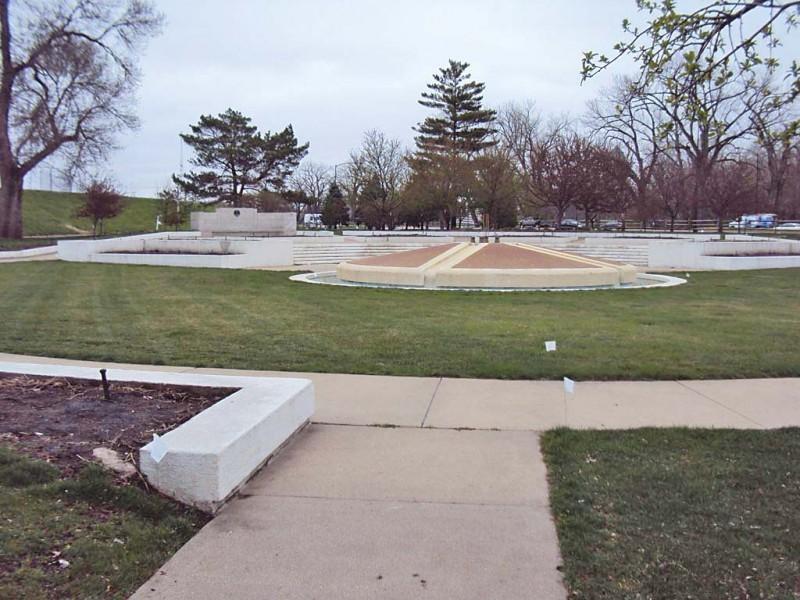Iowa State students prepare international design competition for Water Works Park
Photo courtesy of the College of Design
Students from the College of Design helped redesign the Des Moines Public Water Works.
June 15, 2011
A group of 32 landscape architecture students recently helped officials associated with the Des Moines Water Works create “Parkitecture,” an international design competition for Water Works Park.
“It’s an international design competition open for professional designers, and that would include architects, landscape architects, designers [and] planners, as well as students in professional design programs — similar to what Iowa State has,” said Carl Roger, associate professor of landscape architecture. “It’s a competition to develop some creative ideas for a vision plan for Water Works Park, which is a 1,500-acre park … in the heart of [Des Moines].”
Fifth-year students enrolled in Roger’s Landscape Architecture 441 professional practice course had the opportunity to conduct historical research on Water Works Park so they could prepare the brief for the competition, as well as create the “Parkitecture” website.
Rogers learned of the project from someone working at the water treatment plant in Des Moines. After being asked to help in reviewing a proposal to issue out to professional designers, Rogers made the suggestion that it would be a great project for a design competition. Rogers met with the Water Works Park director over winter break and pitched his idea of making the Water Works Park project a design competition open to students. The competition is divided into two stages, the first of which began June 8.
“The first stage is open to anybody to develop some ideas. There’s a website they’ll submit their entries on by October 3, and then we have a nine-member jury that will review those preliminaries and select between three and five finalists. Those finalists will be invited to Des Moines for a week in November to develop their proposals, and they’ll meet with the Des Moines Water Works board of trustees, other community members and officials,” said Rogers. “[In the second stage] the jury will reconvene, evaluate those proposals and select one winner in probably late December, and from there the Des Moines Water Works board of trustees will take the initiative to work into a design contract or work.”
Much of the students’ work went into preparing for this first stage of the competition. The objective of their work was, as part of a professional practice course, to gain a better understanding of what goes into developing a career in landscape architecture.
“It’s a professional practice class that looks at the career of a landscape architect … from getting a job, working with a portfolio or resume, making contacts, getting the job, having an interview, getting selected and starting to work at a firm,” said Rogers. “I brought the project in to class just to use it as a tool to talk about all of these topics within professional practice. The students worked on the project in conjunction with other class assignments.”
The students’ role in developing the competition allowed them to learn of various issues landscape architect must consider.
“The issues that are current in landscape architecture — river hydrology, ecological design, public space — all of those issues we talk about in design studio, this park project has an immense opportunity to really raise awareness for the city and state,” Rogers said. “And so, having students work on the project prior to design … is a little different [of an] experience but a little more enriching experience. They could understand something more than just doing a design project.”
Part of the students’ work in preparing the brief for the competition was conducting historical research about Water Works Park. They researched historical archives and toured the site to help them develop the context of the project. Since water protection and water treatment are core objectives of the Des Moines Water Works, students looked closely at these aspects when preparing the brief for designers. The project aims to raise awareness of Water Works Park as part of the water supply of Des Moines and increase the value of the park for recreational, educational and practical purposes, Rogers said.
Working with Water Works Park and the city of Des Moines on such projects is something that Rogers sees as an opportunity to continue the learning experiences of landscape architecture students.
“It’s a really interesting opportunity to create a partnership between Des Moines Water Works, Iowa State, the Department of Landscape Architecture and students to work collaboratively to create the structure for the project,” Rogers said. “I think there’s an immense opportunity in working as a department of landscape architecture in educating students to engage in communities.”
The opportunity has benefited not only the landscape architecture students at Iowa State, but also the Des Moines Water Works, said Randy Beaver, CEO and general manager of Des Moines Water Works.
“It’s been a very positive experience. The students have brought a unique perspective to the project overall, and we’re looking forward to some successful proposals being submitted in the fall,” Beavers said.

















